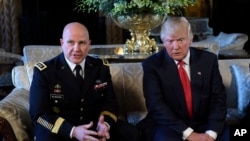President Donald Trump is set to unveil on Monday his strategy to counter what he considers the most dire global threats to the United States.
Trump's national security adviser, H.R. McMaster, gave a preview of the administration's new national security policy on Tuesday at a conference hosted by the London-based policy research organization Policy Exchange.
"Geopolitics are back and they are back with a vengeance," McMaster told the audience.
McMaster said Trump's policy is driven by four key priorities: protecting the homeland, advancing and protecting U.S. prosperity, maintaining peace through strength, and advancing U.S. influence.
The Army general said the primary threats to American security are "revisionist powers" such as Russia and China, which are trying to undermine global order and stability, and "rogue regimes," including North Korea and Iran.
Russia is threatening the U.S. with "so-called new-generation warfare" that includes sophisticated propaganda campaigns designed to "divide our community," McMaster said without mentioning Russia's interference in the 2016 presidential election.
'Competitive engagement'
McMaster characterized China's "economic aggression" as a threat that is "challenging the rules-based economic order that helped lift hundreds of millions of people out of poverty," and he proposed to counter the threats from Russia and China with "competitive engagement," the idea that American prosperity is a national interest.
He suggested that renegotiating trade agreements would be a primary part of the national security strategy.
"The U.S. and U.K. cannot serve as a force for peace and stability in the world if we are not economically and fiscally secure," McMaster said.
He also cited Islamic State and other terrorist groups as threats that are executing and inspiring attacks against the West.
Regarding North Korea, McMaster called on the global community to take action beyond the resolutions adopted by the U.N. Security Council, saying it "might be our last best chance to avoid military conflict."
By some assessments, the threats McMaster prioritized match those presented in 2015 by former President Barack Obama's administration, but that administration spoke of sharing and broadening U.S. economic interests. The Trump approach is more confined, emphasizing that American prosperity is to be protected, not expanded.





